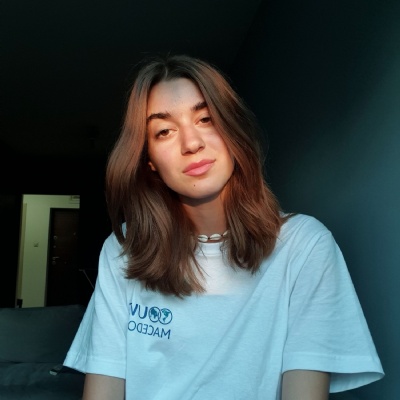
Olja Eftimova
the lantern that makes invisible ink legible
This year, 4 members of the National Committee — Jana, Marija, Kristijan and Bobo — chatted with 2-3 newly selected students each. These profiles are, we hope, an opportunity to learn about them and notice some of the traits that caught our attention during the interviews and the selection camp.
Filter

the lantern that makes invisible ink legible

the lantern that makes invisible ink legible
Five months since our selection process, and three months since I had coffee with her in the spring, Olja struck me as a different person at this summer’s orientation camp. It took me a while to figure out why an absolute social butterfly like her kept quiet for most of our group sessions, when I knew she had so much to say. And then it hit me. In contrast to her best friend Mia [insert hyperlink] (sorry Mia, we love you!), Olja doesn’t seek out the spotlight. She is the spotlight. She is the queen of crisp replies, the master of instant roasts. Whatever someone around her does, she adds color to it. She is the lantern that makes the most invisible ink legible.
Every conversation with Olja is an experience. When she says she struggled to be herself during the pandemic, I believe her 100%: Olja communicates with every atom of her being. She keeps moving her eyebrows, making affirmative gestures with her index finger, and tapping her head in a meme-like fashion. She is а semi-adult version of that cutely annoying kid with no filter who tells her best friend in front of 20+ people that, yes, she can be mean sometimes.
But above anything else, she never forgets to laugh her heart out. My first memory of most of our kiddos is something they said in the interviews. My first memory of Olja – despite her killer interview – is of her sincere laughter at her own group’s struggles to figure out how to allocate hypothetical UWC offers to National Committees around the world in one of our group activities. This doesn’t mean Olja wasn’t driven to get into UWC. It just means she is the kind of person who wouldn’t have been able to do it unless she was having fun doing it.
When you speak to Olja, you get the unique sensation of absolute cluelessness at what is going to happen next. In our final round, we asked her if she had any unpopular opinions. While most other kiddos got political and spoke about the clash between their liberal values and Macedonian social norms, Olja decided to… defend dating shows!? (It was a solid answer: she doesn’t get why people are OK with dating apps but not with dating shows when the latter are more controlled and thus safer.)
Olja’s wickedness comes across in her understanding of UWC, too. “By the time I got my acceptance letter”, she recounts, “UWC Mostar and UWC East Africa were the only ones left. I was praying that I’d get Tansania! What better time than now to go to Africa, see all the monkeys, go on a safari!!??”. Earlier on in the process, while her parents were nudging her to rank the more nearby – and culturally familiar – UWCs higher on her preference list, Olja was watching videos about UWC Dilijan’s reuse of rain as a plant-watering tool…
Of course, as is the case with all of us, Olja’s life is not all smiles. I don’t want to end on a downer, but she makes me think of that old cliché about how those who radiate warmth into the world have to absorb its coldness so they can continue doing so. She knows her sarcasm is easy to misunderstand, maybe even more so in an intercultural bubble like UWC. And despite her confident sense of humour, she does care about how others see her. As a kid, she did theatre; at the age of five, she bombed on stage and got so embarrassed that she stopped doing an activity she loved.
Olja might not be the most popular kid on campus, but she’ll be adored by anyone who makes the correct choice of letting her into their hearts. I can only encourage her to stay who she is and represent Macedonian/Balkan culture in its full roasting glory, while remembering that her unique humor comes from a place of empathy, joy, and ultimately, her love for life.
I can already hear her contagious laugh fill the lawns of UWC East Africa.
Kristijan Fidanovski, July 2023
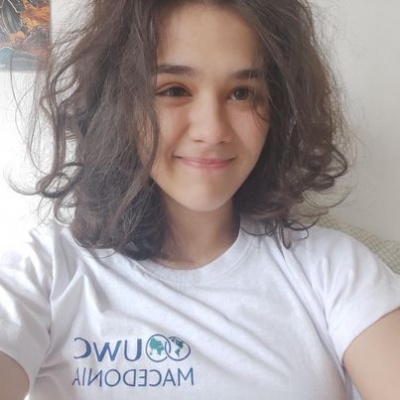
and the pursuit of original ideas

and the pursuit of original ideas
When Bisera goes to see a play, she takes mental notes. She tries to notice when the director deliberately added an element to foreshadow that something will happen. She wonders how the actors changed the play each time they rehearsed, until it was a finished product, ready for her eyes. And then she goes home and tries, in writing, to analyze what she saw and clarify its meaning.
On the surface, these are roughly the steps taken by every theater critic. But this process is the primary way Bisera experiences the world – not just during plays, but in her everyday life, too. She’s curious “how someone got to an idea I like, because I would like to have an idea like that one day.” In pursuit of these ideas, Bisera acts, directs, writes, and does a lot of chatting.
While a lot of 16-year-olds (read: Bobo in 2014) might not know a lot about cultural events happening around them, you can find Bisera at just about every performance in Skopje. She hopped on our Zoom call shortly after the year-end concert by her friends, students at Skopje’s music high school. She finds out about everything that’s happening because she’s quick to make friends: she starts conversations on the bus or at concerts in the park, and she goes to places where she knows she’ll find good conversations. (“You go to a theater to find lovers of drama. You go to the Youth Cultural Center to find musicians. You go to the debate club to find debaters.”)
When she’s not in a gallery, Viktorija, alongside her friends, is developing a student business that will manufacture a device to charge your phone using the thermal energy from a cup of coffee or tea. In the past few months, they’ve made a lot of progress: they’re waiting on a patent for their solution and they’ve already gotten a few awards from entrepreneurship competitions. But despite their success, she recalls the moments when things weren’t going smoothly: a few months ago, they presented at a competition from a parking lot in front of the mall because they couldn’t use school facilities.
After she fills up her vault of ideas, Bisera returns home and starts thinking. She’s got three journals: one for reviews/critics, another for life thoughts, and a third for drawings. Sometimes she’ll try to create something original, like some of the playwrights she appreciates the most. So far, she hasn’t been thrilled with her work. (A play she wrote was, in her words, “experimental” and “badly planned”). But she continues to develop – at least by consuming every theater, art and music performance in and around Skopje – and keeps striving towards an original idea.
I asked her what field she sees herself in when she grows up. She says maybe theater, but she isn’t happy with the stuff she’s written so far. Maybe acting, but she’d like to create something new, rather than reinterpret somebody’s work. Movie criticism? Law? She’s not sure, and she doesn’t have to be. She has two whole years at UWC, where she intends to study literature, theater, and – if they really insist on it – math.
Bisera will be the first Macedonian student at UWC Waterford Kamhlaba in Eswatini, a small country in the south of the African continent. Because the College is in the Southern Hemisphere, classes start in January, which gives Bisera an entire semester to watch shows and listen to concerts. After that, she’ll fly to Mbabane for one truly original experience.
Bobo Stankovikj, July 2023
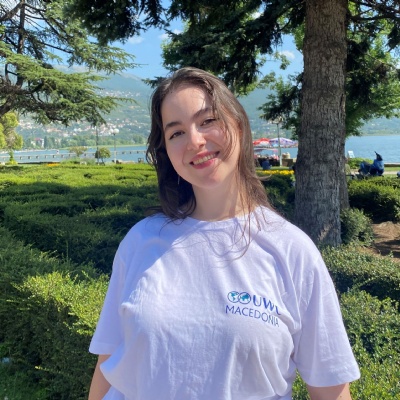
and openness to new experiences

and openness to new experiences
“Why would I narrow my focus?”
That’s the question Viktorija asks me every time I ask her, confused, how she manages to balance all her interests. Her point is: you can – and should! – try new things even when you’re not good at them. “I play soccer even though I don’t want to be a soccer player. People sing karaoke without vocal training.” So why can’t a high school student simultaneously be a painter, a business leader, and a climate scientist?
Viktorija is a visual artist, with a portfolio of drawings you might catch at an exhibition in a gallery, her school, or at least on the wall of the room where she took our Zoom call. Not every piece needs to be ideal. On the contrary, she’s learned the most from works where she got a lot of criticism. “I don’t know why we don’t encourage kids to draw for pleasure, since that’s the way you develop a desire and an interest for art.” In pursuit of that kind of pleasure, her friend group visits galleries and debates the classic question of what did the artist mean to tell us?
When she’s not in a gallery, Viktorija, alongside her friends, is developing a student business that will manufacture a device to charge your phone using the thermal energy from a cup of coffee or tea. In the past few months, they’ve made a lot of progress: they’re waiting on a patent for their solution and they’ve already gotten a few awards from entrepreneurship competitions. But despite their success, she recalls the moments when things weren’t going smoothly: a few months ago, they presented at a competition from a parking lot in front of the mall because they couldn’t use school facilities.
At the same time – and completely unrelated to her other interests – Viktorija is learning Chinese. She started because of a friend whose dad came from China to Macedonia, and she liked the language so much that she’s now taking classes. She’s gotten to the point of light conversation (“Once a month we have calls in a mixture of English and Chinese, and we’re at the point where we can now gossip. Don’t put this in your profile.”) She’s thrilled that she’s already met her future UWC peers who she can practice with.
And that’s how we get back to the central theme of our conversation: you can’t know what you like, or what you’re talented in, if you don’t try things out. So even though it’s hard to predict what a UWC experience for our students will look like, one thing I am sure of: Viktorija’s going to try just about every activity UWC has to offer.
She isn’t likely to pursure a career in any of these fields, though. Academically, Viktorija is interested in chemistry – especially environmental chemistry. At the Canadian UWC, she’ll be part of a new Climate Action and Leadership Diploma program. She’ll be taking classes in chemistry and biology, but also listening to lectures from Indigenous leaders from Western Canada. Even before she had heard of UWC, Viktorija would recycle her paper. I don’t mean “she put used paper in the recycling bin.” I mean “she took used papers, recycled them, and made them into new, usable pieces of paper.” On her own! In her home!!
Bobo Stankovikj, July 2023
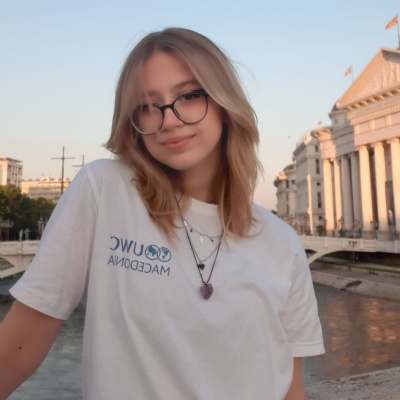
and measured steps

and measured steps
Martina always has something to do with her day. We talked over video – I was outside, and she was in her room. We talked a lot about the room. It is common for people to be in their room, but not everyone makes it their home. Martina loves to organize her environment and finds peace in privacy. She told me that if the walls could talk, they would explain how much she values her living space and everything it allows her to manage. She told me she was a germophobe with a special protocol for entering the house and the room. She is always cautious and consistent with her standards.
Martina is annoyed by people who do not know how to communicate. Whether it’s about positive or negative thoughts, lack of communication is something she cannot accept. It is crucial to her that people are open, as she is with them. If you spend even a little time with her, you will realize how much she does not like to chit-chat and ramble but rather focuses on the quality of the conversation. I got the same impression during our call – sometimes, I would talk too long about a simple question, and she was ready to give me an answer after the main thought.
The conversation about communication led us to question how she thinks her closest friends see her. Without any assumptions, quoting the words of a friend she was on vacation with, she told me, “Martina does not give up easily.” This can be seen in many examples from her life, but the statement was inspired by a specific situation when they were doing makeup at the same time. You will immediately notice the big, bold, and flawless eyeliner if you ever see Martina. Efficiency, decisiveness, and practice are evident in the results.
Apart from makeup, Martina is also interested in fashion but doesn’t like that Macedonia lacks thrift stores. She told me about her disdain for fast fashion and her attempts to reduce her individual consumption. She is constantly working on it and finding ways to make her lifestyle more sustainable.
When we talked about her favorite place in Macedonia, she mentioned Kratovo. Her grandfather is from there, so she has visited the city to learn to appreciate every aspect. She said she likes how it is quiet and peaceful. People find ways to entertain each other and live peacefully side-by-side.
Mostar reminds her of Kratovo – a small city with a lot of soul. It’s a great coincidence. We made a good choice allocating Mostar to Martina – somewhere she’ll feel reminded of home and where she’ll get to live more independently.
Kristijan Fidanovski, July 2023
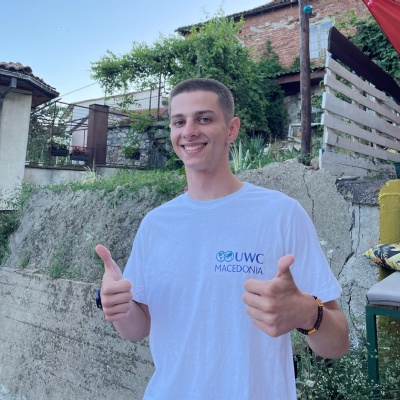
and the competitive spirit

and the competitive spirit
A good chunk of the TV shows I grew up with feature a friend group whose lives are eventful enough to fill about a hundred episodes. You’ve seen these friends – in Friends, in How I Met Your Mother, in Community, and the like.
This story is about Gorazd Gajdov, a member of one such friend group. Gorazd, Marko, Stefan and Mate are four boys from Skopje, students at Georgi, who grew up – and are still growing up – together. They hang out in Kapishtec and Vodno and visit each other at home. They help each other with chores, so last week they helped with Marko’s mom’s garden. (Gorazd mowed the lawn.) They’re kids (almost-adults?) with a long history of jokes and pranks, whose main pastime is competition.
The point of these competitions isn’t winning – at least, it isn’t mainly winning, although winning is nice. The point is to motivate each other to learn something and get better, which is why they keep nudging themselves towards new goals. Last year, they realized they didn’t know much about music. So, they decided to hold weekly music meetings, where each of them would bring a song from a different genre that he’d like the others to know about. One of the entries last week was SAF, a rap group from the 90s, which Gorazd described as “old Macedonian rap” and sent me into an identity crisis.
In this way, Gorazd mostly competes with himself. When he trained fencing, he wanted to improve his technique – instead of only scoring off of competitors’ hands, he tried to broaden his range of attack. When he reads, he usually looks for self-improvement books in the style of Atomic Habits by James Clear. And when he grabs the guitar, he wants to learn new melodies – he’s set a deadline of 3 weeks to learn Capricho Arabe by Francisco Tarrega.
Before the last interview, we ask the finalists to send us a video titled “This is me”. Gorazd’s video features a total of one scene where he’s alone – and even in that one, the cameraman is Mate. Going to UWC will inevitably disrupt this dynamic, so they’re using this summer to slowly get used to goodbyes. The plan is to call once a week. But just in case, they’re setting up goals: by next summer, I want you to beat me in basketball, or I want you to run a 5k in under 20 minutes. For Gorazd, my only challenge is: by next summer, I want you to come home and be able to say “whoa, look at how much I’ve grown.”
Kristijan Fidanovski, July 2023
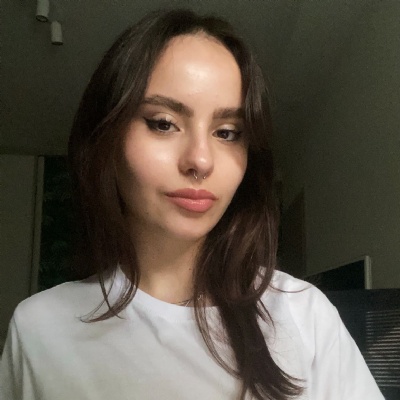
and the connected whole

and the connected whole
Every UWC student begins their story with how they found out. Because regardless of how much we try to do online promotion (and we really do try!), the thing that gets the job done most often is word of mouth – organic, unplanned.
This story begins with two neighbors in Mlechen, real locals, chatting about the things they think about the most: their kids. The first neighbor mentions her nephew is headed to Singapore; her friend listens and prepares a neighborly response.
Turns out that the nephew ends up headed to Thailand, and the listening neighbor conveys everything to her own niece – which begins Dina’s UWC story.
I say “her UWC story” because this actually isn’t Dina’s first time being part of the UWC experience. Last summer, she participated in a UWC Short Course in Germany, which inspired her to try and continue her education at a UWC.
The first thing I noticed about Dina was her maturity – and her extraordinary empathy. From the moment she joined the Zoom Dina was so smiley that she made me forget about everything else that day, and had me completely present and focused on what she was saying.
She smiles the most when she talks about communities, about relationships with other people. “I learned a lot from the Short course. We covered a bunch of sustainability topics, but the biggest lesson was how quickly you can grow close to someone,” she told me.
Throughout those three weeks, she became such good friends with some of the other participants that she actually called me from Greece, where she was visiting a friend from the Short Course. After each anecdote, it became even clearer how community-building comes naturally to her.
She spoke with love about everyone and everything she mentioned – the story about the neighbors in Mlechen, her pets, her friends, even her subjects.
When I asked her what she’ll miss the most, she told me that saying goodbye to her three cats and a dog will be one of the hardest parts. She loves animals – and she volunteers at the Happy Shelter in Skopje. She can’t wait to see some of the animals in Tanzania, either.
She spends her free time watching documentaries. Instead of getting into recommendations, she told me: “I like listening to people talking about topics they know well – it makes a lot of sense when everything is one connected whole.”
One such “connected whole” is the trio of Macedonian girls in Tanzania – Dina, Olja, and Emira. She’s excited about the opportunity to speak Macedonian and share any culture shock.
As far as her subjects go, she’s confident she wants to focus on the humanities. She’ll definitely take English language and literature, global politics, and history – and, as we realized that was the same subject package I took, we delved deep into the specifics about how they’re all related.
In essence, Dina is a person of connections. Connecting with others – with friends from the Short Course, with animals, across subjects, across her life today and what she wants to bring to Tanzania. “I know I gave the application my all, and it was a massive weight off my chest when I got the call. It makes going to Tanzania seem easy in comparison!”
If there’s one thing I can predict, it’s that Dina will bring her empathy and warmth to Tanzania, and she’ll become an irreplaceable part of the community at UWC East Africa – in her words, part of a connected whole.
Marija Janeva, July 2023
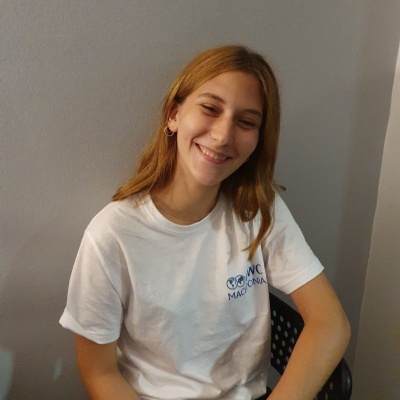
the fearless girl with the blue notebook

the fearless girl with the blue notebook
Halfway through our orientation camp in Ohrid, we gave our kiddos a chance to open up to us – and to each other – about anything that makes them anxious ahead of their UWC experiences. 10 minutes into the session, Mia raised her hand. In a voice shattered from days’ worth of partying, babbling, and the inevitable emotionality of the moment, she told us she was afraid that UWC would take a toll on her friendships at home. That she might let her parents down. That she might burn out by the end of Term 1.
And yet, even though she went further than anyone during that session in laying her vulnerabilities bare, vulnerable is the last word I would use to describe Mia Dragnikj. The strength she displayed in sharing her deepest anxieties about the future is the same kind of strength – the same kind of fearlessness – I saw in her eyes the first time I met her last January, as she was waiting to be called in for her second-round interview. She was holding a blue notebook tight to her chest, head up high. In an ice-breaking effort, I asked her half-jokingly: “Would the Girl with the Blue Notebook care to come in?”. With a disarming smile, she immediately accepted my humour (“The girl with the blue notebook will indeed come in now!”) and walked in with intent, ready for whatever we might throw at her.
And boy did we throw things at her. One thing we asked all our applicants that day was to reflect on a time they had to break bad news to someone. Most of the kiddos would talk about bad grades and rejected applications. Not Mia. Without even blinking, she told us how she found out a friend was being cheated on by her boyfriend. Ever the warrior of justice, she informed her friend right away and never regretted it, even though the friend didn’t believe her and stopped speaking to her for months.
Because when it comes to choosing between the easy thing and the right thing, Mia will always choose the latter. Back in January, she said she felt the right thing for her would be to get a PhD in biology one day. I remembered this a few months later during her third-round interview, so I pressed her on the topic of allowing transgender athletes to perform alongside athletes outside of their biological sex. While I disagree with her verdict on the topic, I was awestruck by her three-minute explainer on the biological mechanisms of hormone therapy. I’ve come across many eloquent 16-year-olds in my role as admissions officer, but nobody has made me feel like I’m speaking to an intellectual equal quite as much as Mia did that day.
In fact, as I came to realise at this summer’s orientation camp, an “equal” might be an understatement. Operating on 2 hours of sleep, and with her voice all but gone by this point, Mia decided to debate EU enlargement with me on the way to Kaneo. She speaks a funny brand of Macedo-English (“grades-oт”, “subjects-от”), which I would normally look down on. Yet, somehow she always manages to get her point across in the smallest number of words necessary, with devastating precision.
I don’t know if Mia will go on to be a biologist — she says medicine and international law are on the table too. What I do know is that she will be exceptional at whatever she sets her mind to – and I think she knows it too. When other applicants freaked out about their Round 2 performance, she cried because she said she wanted to go to UWC Southeast Asia, which ended up not being available. Unsurprisingly, the only thing the Girl with the Blue Notebook could possibly imagine preventing her from being selected was… a logistical mishap. And she is so ready for UWC Changshu: “When you go and talk to someone in Debar Maalo, you know this person isn’t someone who’s going to change the world”, she says in her trademark let’s-be-real tone.
But don’t mistake Mia’s confidence for arrogance — an error I’m sure so many people she’ll cross paths with will make. Ultimately, what made her orientation camp speech about her pre-UWC anxieties so powerful wasn’t her eloquence or intelligence but her touchingly profound introspection about the wide range of people in her life who will be affected by her departure. A few minutes into her speech, she burst into tears. “Do you need a minute”, someone asked. “Nah”, said Mia, almost indignant at the suggestion. “I’m just getting started”.
Kristijan Fidanovski, July 2023
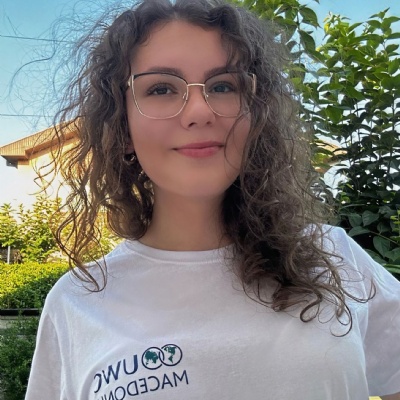
and her introverted extroversion

and her introverted extroversion
Or extroverted introversion? We talked briefly about what it means to be one or the other. It’s hard for me to estimate Mila’s level of introversion. She describes herself as introverted but encourages herself to be more extroverted. We’ve asked questions on this topic in previous years of selection. Even though this was an informal conversation, I couldn’t help but ask her if she thinks one must be an extrovert to integrate into new environments like UWC successfully. To that, Mila replied – “No, not at all.” I don’t think it matters, and it’s just important to know how to express yourself.”
We touched upon her trying to be more extroverted. I was interested in why she actively makes that choice, especially when she doesn’t think it’s essential that she’s an extrovert. Mila just keeps finding ways to get out of her comfort zone and escape the status quo.
Erasmus+ projects helped her the most with this. Meeting people from scratch in a multicultural environment made it easier for her to speak more and louder. Through these projects, she realized she works well in such settings, giving her a chance for personal development through new challenges. Compared to that, small environments do not allow her to boost her potential. As a peer leader, Mila is critical of Macedonia’s education system and practices, specifically in smaller towns. “I was more introverted before, but I think high school also changed me – I started to face awkward situations instead of running away from them,” said Mila. She believes that teachers and students do not have a close-enough relationship and that education is reduced to memorization and numbers. As class president, Mila encouraged her classmates to think about how to improve the educational process at the local level. It is a long process, so we hope future generations after Mila will devote themselves to that cause just as seriously.
Mila cherishes family traditions. The first time I noticed how much she values her family was in the video she prepared for the third selection round. When I met her in the presence of her parents, I saw how joyfully she included them in her everyday life.
Many neighbors and relatives describe Mila as “Dobrichica” – someone kindhearted who is always ready to help. This description comes from the fact that she constantly helps people around her without expecting anything in return. She only mentioned this once during the selection process, but it stayed on my mind ever since. I believe that’s a perfect word to describe Mila.
I wish her the best of luck at MUWCI. As an introvert or an extrovert, I am sure of her ability to thrive in the new environment.
Jana Kraleva, July 2023
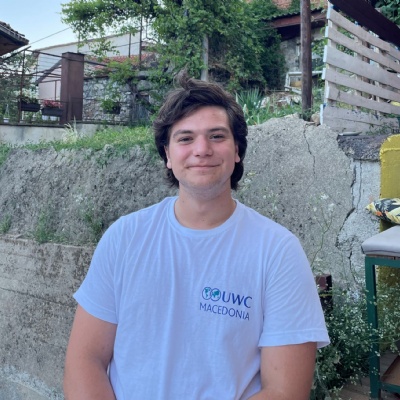
and finding thrills in simple things

and finding thrills in simple things
When I met Ilin, we were at a hangout in Kashmir with fifteen other students. He was eager to sit at the ‘hot seat’ and start answering all of my questions – and even ask me some in return. When I tell you Ilin is a thrillseeker, I don’t mean activities that give you that adrenaline rush. Ilin finds thrills in simpler things.
He and I share a lot of common experiences – from Korchagin, and high school life more broadly. We both had the same class head and many of the same teachers. And for everyone he mentions, Ilin has nice things to say. Even when pointing out flaws, he sandwiches them with the positives. “It was hard for me to get used to the countless pieces of feedback we get, but the strictness helped me work on myself and improve my writing,” he said.
I had a chance to get to know him at the orientation camp. After each break in between sessions, Ilin would run back to his seat holding a paper and a pen. The paper was always filled with proofs, solutions to math problems I haven’t yet figured out – honestly, I never got the chance to ask what exactly he was solving for. And when I spoke with him, he told me that the academic life gives him satisfaction. “The circumstances, the vibe, that comes out of life in academia makes me happy.” If he had complete freedom and no material constraints, he wouldn’t hesitate to visit some famous university with a big library.
Ilin wants to be a math professor. Not just any math, either – he wants to do abstract algebra. I find his strong desire curious; I know plenty of exceptional math students who regularly get defeated by that field. And it’s not like he’s mastered it, either. “I can’t say I feel comfortable in that huge branch of math, and there’s a ton I still need to learn. But abstract algebra is what fascinates me, and it’s what I want to teach one day.”
He’s not only into math, of course. Legend says that the Macedonian national committee sends a Tool super-fan to UWC at least every 3-4 years. We discussed their music, and I recalled my own selection process: Ognjan questioned me about Tool, and I spent a good quarter of my interview talking about them. I saw the same enthusiasm in Ilin and curiosity to hear my take on 10,000 days and the lives of the band members. The depth of his questions showed me he is a careful listener and an interested conversationalist.
He says he isn’t afraid of anything, so I am confident the UWC experience will just be a nudge to improve himself. Challenges await in Changshu – but he’ll tackle them the same way he tackles his math questions: with effort, stubbornness, and an ability to find unsolved problems thrilling.
Jana Kraleva, July 2023
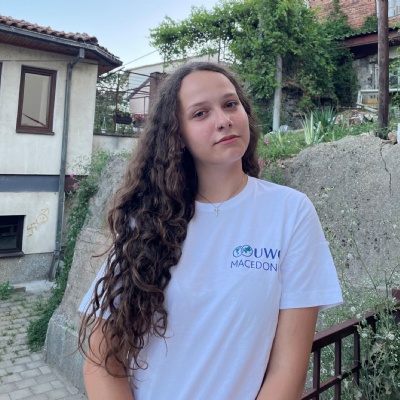
and poetic growth

and poetic growth
The first thing I noticed when Daria joined our call was the ease she spoke with. Not only was she relaxed, but the way in which she formulated sentences was so natural, eloquent and full of purpose.
While I was trying to think of contentful questions, Daria made my job easier by giving answers much richer in content than any question I could ask, with words that capture exactly what she wants to say and a flowing thought that not once stopped.
Unsurprisingly, the first interest of hers she talked about was literature. “I adore poetry, books, readings, and I’ve been writing poetry myself for years”. If you’ve talked to Daria, this makes complete sense as every sentence of hers sounds poetic.
Her education in Macedonia both started and finished in Yahya Kemal, where she especially loved the cultural diversity. “I think it’s one of the most diverse schools in Macedonia, despite UWC Adriatic being quite different, I think Yahya makes for a good foundation.” – she says.
Her extracurricular activities in Yahya Kemal varied from drama club to debate club, which she founded and remained the leader of. Both perfectly exemplify the mix of art and ration that characterize Daria.
“I love every type of art, whether it be literature, visual art, films, music – I simply enjoy it” – says Daria, after we discussed her interest in visiting museums when she is traveling.
As a book recommendation, she went with “The Bell Jar” by Sylvia Plath, which she bought for her 15th birthday and has read multiple times. “The way Plath subtly incorporates autobiographical elements and represents the female experience is special to me” – she states.
Intrigued by this answer, I wondered which movie Daria would recommend. “White Oleander” was her pick and not only did she mention it, but also provided a description full of imagery and a mini-analysis through which I realized how much she enjoys finding meaning in art. “Every family [the character] changes is a different story about her growth and adaptation to the circumstances” – Darial tells me before she jumps into analyzing the aforementioned changes the character undergoes.
One thing that all of her interests have in common is the element of self-discovery. Instead of describing the characters, she looks at their development through changes, reactions, ways in which they are represented and her own interpretations.
She not only understands others very well, but also exceptionally knows herself, without letting herself be limited by that in the context of what she becomes in the future. I do not doubt that her introspection and love for self-discovery will follow her to Italy and I cannot wait to see how she will turn that into art in her unique way.
Daria’s self-discovery was evident during every part of the conversation. Practicing yoga which she recently took up, talking about her life path until now and how she expects it to change, the mini room tour she gave me, reading, movies…
Marija Janeva, July 2023